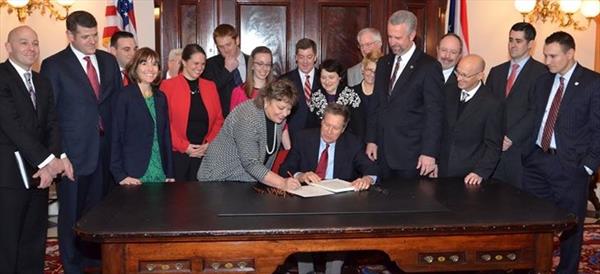Ohio Municipal Tax Updates
Jan 06, 2015
As you may have heard, Governor Kasich recently signed the Municipal Income Tax Reform Bill, which is known as the Amended Substitute House Bill 5 (“HB5”). There is an extensive list of provisions that will take effect on January 1, 2016. Ohio taxpayers have been eager for a bill to emerge that simplifies Ohio’s municipal tax law, and HB5 is a step in the right direction. Here are some of the major changes that you should be aware of:
Pass-Through Entity (PTE) Tax: It is important to know that the municipal net profits tax will be imposed at the entity level for pass-through entities (PTE), but PTE owners will generally be taxed on the pass-through income by the municipality in which they reside. HB5 will stay consistent with the previous law set in place for S corporations, meaning tax is imposed at the entity level, and the pass-through income flowing through to resident owners will generally not be taxed by the municipality.
Net Operating Loss Carryforwards (NOL): Starting on January 1, 2017, carryforwards for NOL’s at the municipal level will be consistent across the state. Any loss incurred after the implementation date will have a required 5 year carryforward period, regardless of the municipality. Remember having to keep track of NOL carryforwards separately for each municipality? This is no longer required due to carryforwards now being calculated on a pre-apportionment basis.
Occasional Entrant Revisions: This provision of the municipal tax reform is associated with the amount of days an individual may work in another municipality, away from their primary place of work, before being required to withhold income there. HB5 has increased the amount of days from 12 to 20. Therefore, if an employee is working in another municipality for 20 days or less, the employer will withhold income from where the employee’s primary place of work is located. If the employer expects the employee to work more than 20 days in another municipality, they are required to start withholding from day one. On the other hand, if an employee happens to work over 20 days, which was not originally expected by the employer, the employer must begin withholding income on day 21. For employers who may try to rotate employees to bypass the 20 day rule, provisions are set in place to prevent this.
Does your business collect less than $500,000 of revenue in a given year? This classifies your company as a small business, which means complete exemption from the 20 day rule. Small businesses are only required to withhold income tax from their employees in the municipality of their fixed location, which could be a warehouse, office, etc.
These are just a few of the provisions associated with HB5, which is effective on January 1, 2016. For a deeper look into the provisions and more, click here.
Jason Wenner, Staff Accountant
Categories: Uncategorized

